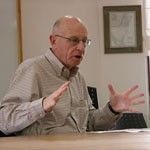By Ira Sharkansky, Ph.D

JERUSALEM — Israel has had primaries for the Labor Likud parties.
His close supporters did well, in filling eight of the first 13 places on the ticket. Bibi’s critics did less well. Yuli Edelstein fell from first place to number 18. He’s still likely to enter the next Knesset.
Other Knesset Members, who were close to the top of the list fell to where they are likely to be reelected to the next Knesset, but seemingly out of the running for what had been prominent positions as ministers.
Results in the Labor Party primary were more dramatic. What was once Israel’s leading party is now—along with Meretz—scraping by lower levels in order to retain a place in the Knesset. And the primary results show two of its Ministers falling below the level where they are likely to be selected to the next Knesset.
So Bibi can celebrate. His supporters did well in Israel’s largest party. Will the November election produce at least 61 seats for Likud and its partners? Or will a cluster of parties led by Yair Lapid get enough to challenge him? Perhaps with some who drop out of Likud? Perhaps with the support of one or two largely Arab Parties?
Lots of questions.
And Bibi’s lawyers have petitioned the court to drop the prosecution of one or more of the charges against him.
What’ll happen to Israel’s separation of powers, where the enforcement of law is kept alive by prosecutors and judges?
The present government passed up the opportunity to legislate against a person charged with crimes to be a candidate for the prime ministership. And despite the serious evidence against Bibi, he’s demonstrated his political strength. We’ll see how strong it really is some three months from now, when Israel goes to the polls.
And his friend, Donald Trump, is suffering from his own problems in the U.S. But, like Bibi, Trump remains strong, and a likely candidate to run in the presidential election of 2024.
Will we be governed by individuals on the fringes, or actually outside of the law?
Do you believe in the role of democracy? More than the rule of law?
Among the questions is that of Israel’s Eastern Jews, i.e., Mizrachim or Sephardim. Have they remained a bloc supporting Likud and Netanyahu? Or are they increasingly a mixed population? Their older members, thought of as firmly Likud, are dying out. Younger Easterners are less Eastern. They are intermarrying, rising econmically, and leaving the locales long thought of as Eastern centers. Younger Israelis tend to identify as Israeli, and neither Sephardi or Ashkenazi. And it’s likely that Bibi remains popular among all clusters. He speaks well, in both Hebrew and English, and shows no reluctance to identify with major national symbols. Likud is more of a centrist than a clearly right-wing party. It supports issues long thought of as left of center, as well as postures seeking Israeli control over portions of the West Bank. Bibi has also sought alliances with Arab parties, perhaps more quietly than other politicians. Control, rather than posture, seems more prominent in his profile. He’s also aligned himself with the ultra-Orthodox parties, as well as the parties led by extreme rightists like Itamar Ben Gvir and Bzalel Smotrich.
All told, Israeli politics are those of coalitions, bargains, clusters of supporters, and the egos of those at the top of what are called political parties. What’s clearly left or right? Better asked than answered. What was formed by Naftali Bennett and taken now by Yair Lapid, is a coalition ranging from left to right. Individual politicians left that coalition over insignificant matters, most likely an expression of their ego than their beliefs. The nation is caught in what’s most likely to continue as a close tie, with being pro-Bibi or anti-Bibi the prominent factor.
Different from the United States? Not essentially, except in the larger number of parties running for Israeli leadership. Prominent in both countries are the postures of Bibi or Donald. Both are under investigation. Both remain popular. Neither prominently identified by posture of ideology.
*
Ira Sharkansky, Ph.D., is professor emeritus of political science at Hebrew University. He may be contacted via ira.sharkansky@sdjewishworld.com